News
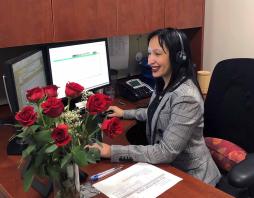
Esteffani Alcantra: Becoming a well-rounded leader
Five years ago, Esteffani Alcantra was living in the Bronx and was a patient outreach manager for a hospital system.
Five years ago, Esteffani Alcantra was living in the Bronx and was a patient outreach manager for a hospital system. She oversaw a team of 12, but the single mother knew that without a degree, chances of advancement were slim.
To give herself more time for school, five years ago Alcantra and her daughter, Amber, moved to Reading to live with Alcantra’s stepfather. She initially took a less demanding secretarial job and began working on a liberal arts associate degree from Reading Area Community College.
“I started working at the hospital at 19 and received three promotions, but when I asked for either another promotion or more money, I was told you hit a dead end because I didn’t have a degree,’’ said Alcantra, 30, who earned her associate degree in 2015 and her Bachelor of Applied Science in Technical Leadership (BASTL) from Bloomsburg University in May 2017.
Alcantra, who now works as a customer service representative for a plastics manufacturer, said she was attracted to the BASTL program for its flexibility – classes were online or at her community college – and the wide range of topics covered. At her current job, she’s used the practical skills such as web design and virtual tools to communicate with coworkers and clients in distant locations, as well as leadership training to help her resolve conflicts and better communicate with those at various levels in the company.
“The degree makes you a well-rounded leader because you get into accounting and management and other technical skills as well as intrapersonal skills and cultural diversity that you experience everywhere,’’ Alcantra said. “As a single mother of one and a full-time employee, the ability to take online courses and satisfy the Bloomsburg curriculum at RACC was definitely a determining factor.’’
In the future, Alcantra said she wants to pursue a masters in instructional technology and eventually move into a position where she is involved in training and development. In addition to being important to accomplish her career goals, she said advancing her education was something she needed to do for her daughter.
“I want my daughter to take after me and I have to lead the way,’’ she said. “As a parent and as a leader, you can’t just tell others what they need to do, you have to model the behavior you want others to show.’’
After consulting with employers who are looking for skilled managers, Bloomsburg University created its Bachelor of Applied Science in Technical Leadership program especially for individuals with associate degrees who are working and need flexibility. Up to 60 associate degree credits are accepted and half the BASTL classes are online and the rest taught at Bloomsburg’s partner institutions: Bucks County Community College, Community College of Philadelphia, Harrisburg Area Community College, Lehigh Carbon Community College, Northampton Community College and Reading Area Community College, and the State System campus in Center City Philadelphia. Learn more.

RACC Students Kayak for the First Time at the Schuylkill River Sojourn
June 13, 2018/Gibraltar, PA/National Heritage Areas Program
June 13, 2018/Gibraltar, PA/National Heritage Areas Program
The Schuylkill River Greenways National Heritage Area hosted the 20th Annual Schuylkill River Sojourn. This is a 112-mile guided canoe/kayak trip from Schuylkill Haven to Philadelphia’s Boathouse Row, with participants traveling 14-18 miles each day over the course of a week.
This year’s Sojourn featured the inclusion of 10 students from Reading Area Community College who got to kayak in the Sojourn as a part of a mentorship program. Teamed up with seasoned mentors, the students paddled from Allegheny Aqueduct Park in Gibraltar to Pottstown Riverfront Park, while experiencing first-hand the historical evolution of the river.
Executive Director Elaine Paul Schaefer stated, “We were thrilled to have them join us. It is an important goal for our organization to reach out to and engage the next generation in our mission and work.” Given the program’s success, plans are underway for its continuation. Fundraising efforts have already begun with the auction of a coveted water trail sign.
Schuylkill River Greenways NHA was able to offer the student mentorship opportunity through a partnership with Make the Road Pennsylvania, a nonprofit organization that works in Latino communities to achieve dignity and justice through organizing, policy innovation, transformative education, and community leadership.
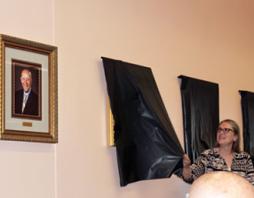
RACC Unveils Presidential Portrait Gallery
Reading Area Community College unveiled portraits of its first five presidents and the portrait of president-elect Dr.
Reading Area Community College unveiled portraits of its first five presidents and the portrait of president-elect Dr. Susan Looney during a reception following the Wednesday, June 13th Board of Trustees meeting. During its 47 years, RACC has had five presidents. “Having had only five presidents in 47 years helped to give RACC tremendous stability,” Weitz says during the unveiling of portraits of the former presidents in the River Room of the Yocum Library.
The portraits – of Dr. Byron L. Rinehimer, Jr. (1971-1974), Dr. Lewis W. Ogle (1974-1986), Dr. Gust Zogas (1986-2002), Dr. Richard A. Kratz (2003-2007), Dr. Anna D. Weitz (2007-2018), and Dr. Susan D. Looney (2018) – hang in the River Room on the fourth floor of the library.
“Each of these leaders rose to the challenges of their day and positioned the College for continued success. As the current steward of RACC, I remind myself often that I stand on the shoulders of giants and I try to emulate their example,” says Weitz, who will retire at the end of this month after 11 years as president of RACC.
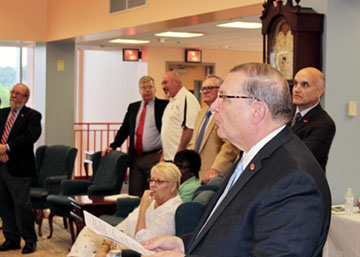
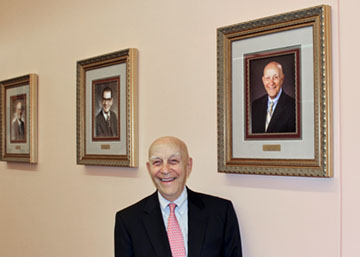
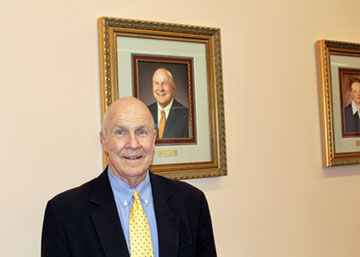
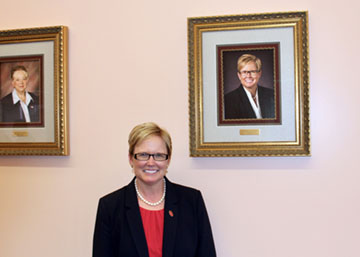
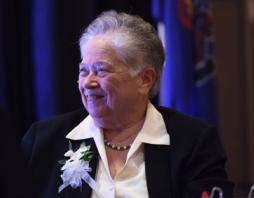
RACC thanks outgoing president with reception
Written by David Mekeel/Reading, Pa
It's hard to succinctly sum up more than a decade.
But standing in the ballroom inside the DoubleTree by Hilton hotel in Reading on Friday night, Dr. Anna D. Weitz, outgoing Reading Area Community College president, gave it her best try.
"As I think back on my career, and especially my 11 years at RACC, the word that most often comes to mind to characterize my professional approach is stewardship," she said. "That may sound a bit burdensome, maybe old fashioned. But please believe me when I tell you it is neither. In fact, it is very helpful to have a guiding point of light when one is making complicated decisions at a dynamic and ever-changing institution."
The college celebrated its departing leader during a retirement reception aimed at thanking Weitz for the tireless work she has done.
Weitz said she always made it a priority to wisely use the financial investments made by students and their families, taxpayers and donors. And she added she always tried to make the volunteer board of trustees and the members of RACC's foundation board proud.
Weitz, who is retiring at the end of the month, said she feels community colleges like RACC hold a special place in communities, and getting a chance to play a part in them has brought her immense joy.
"Community colleges marry individuals' hopes with the opportunity and support to make dreams come true," she said. "It is as simple and wondrous as that. What a privilege it has been to be a community college educator, especially at RACC."
Weitz said it is was clear from the first time she stepped on campus at RACC that the school was dedicated to those ideals.
"What I quickly found here that was different was a sense of how much this college is beloved by its community, and I use the word beloved deliberately," she said. "I soon realized that RACC has an exceptional commitment to student success and to community partnerships that is baked into our institutional DNA."
While she might be leaving her post at RACC's helm, Weitz told the crowd, she will not be abandoning Berks County. She said she plans to continue to live locally and will stay involved in the community.

Reading Area Community College gets $751,695 for adult education
Reading Area Community College has received a state grant of more than $750,000 aimed at supporting adult education.
The school was awarded an Adult Basic Education Direct Service grant through the state Department of Education in the amount of $751,695. The college has been an annual recipient of the grant.
According to Rhonda Hudak, director of grant development and management at RACC, the money is used for a number of programs including adult literacy and GED preparation programs, training for tutors and supporting the partnership between RACC and the Berks County Workforce Development Board and CareerLink to address the core education needs of the non-English-speaking workforce by providing access to English as a second language classes.
State Rep. Thomas R. Caltagirone, who announced RACC's receipt of the grant Wednesday, lauded the impact the grant has on the community.
"These are the kinds of public-private partnerships that net results in our community," he said. "Literacy and continuing education classes are good for families looking to succeed and contribute to the economy. Reading Area Community College is an outstanding resource and ally for those goals, and I'm pleased that the state saw fit to invest in their mission.
"I look forward to providing more opportunities for funding in our community."
Adult Basic Education Direct Service grants are available to school districts, libraries, volunteer literacy organizations, public housing authorities, community colleges and public and private nonprofit organizations.
Features & News
Reading PA—The Foundation for Reading Area Community College (RACC) is delighted to
READING, PA — Reading Area Community College’s Nursing Program has been ranked
